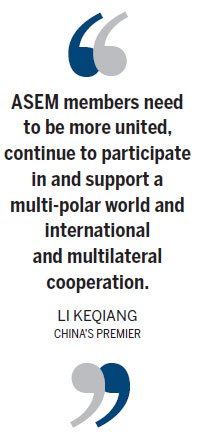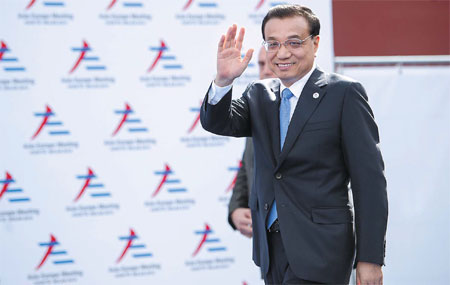China promotes Eurasian partnership
Updated: 2014-10-24 07:29
By Zhao Yinan and Fu Jing(China Daily Europe)
|
|||||||||||
|
Premier Li Keqiang arrives at the Asia-Europe Meeting in Milan on Oct 16. He said at the opening of the event that trade protectionism should be rejected. Xu Nizhi / Xinhua |

Fresh initiatives proposed by premier at Asia-Europe Meeting foreshadow progress
China's fresh efforts to enhance international and regional cooperation highlighted the just concluded 10th Asia-Europe Meeting summit in Italy.
Speaking at the two-day summit on Oct 16 and 17, Chinese Premier Li Keqiang called on Asian and European countries to safeguard peace and security and boost interconnectivity so as to promote development of the world's largest landmass.
He suggested that countries in the region stick to the spirit of openness, inclusiveness and shared destiny, and work together to construct a new type of Asia-Europe comprehensive partnership.
"ASEM members need to be more united, continue to participate in and support a multi-polar world and international and multilateral cooperation, and work to improve various mechanisms of dialogue and cooperation," he said.
"We also need to commit ourselves to enhancing mutual trust and resolving crisis, and to addressing conflicts and disputes through political and peaceful means. Together, we may work to promote the building of a new pattern of international relations featuring peaceful coexistence and win-win cooperation."
Jia Xiudong, a senior research fellow with China Institute of International Studies, says: "Li's words emphasize the importance of political efforts of all Eurasian countries to maintain regional peace and stability."
Representing a large portion of the globe's population, Eurasian countries play an important role in the world, so a peaceful and stable environment is crucial, Jia says.
Though Asian and European countries share the same landmass, geographical obstacles have hampered their trade.
"Connectivity leads to prosperity, and that's what Eurasia urgently needs. China has initiated the Silk Road Economic Zone and the 21st Century Maritime Silk Road and is ready to work with countries in the region to build a network of infrastructure connectivity for Eurasia, so as to deepen regional cooperation and promote common development," Li told other leaders at the summit.
China will host a dialogue on Asia-Europe connectivity next year, and will initiate a number of cooperative projects in the area, he said.
Trade between Asia and Europe accounts for only 10 percent of their total trade, which points to a huge potential to be tapped.
"To expand economic cooperation and trade between Asia and Europe, we need not only the hardware basis of connectivity, but also the software support of institutional arrangements," Li said.
"We need to hold high the banner of trade and investment liberalization and facilitation and work together to uphold a fair and non-discriminatory multilateral trading regime. We need to build an open and inclusive regional free trade arrangement, resolutely oppose all forms of protectionism, and speed up the development of an integrated Asia-Europe market."
Cui Hongjian, director of the Department for European Studies of the China Institute of International Studies, says: "The ASEM summit has offered a good opportunity to bring the Silk Road Economic Zone and the 21st Century Maritime Silk Road concepts into Asia-Europe cooperation."
China proposes that a meeting of senior officials on trade and investment be held in 2015, to set the stage for holding an ASEM economic ministers' meeting as soon as possible.
Li also emphasized the importance of enhancing exchange and cooperation on innovation; promoting green, low-carbon and smart growth; and creating new highlights in the economic growth of the two regions.
"China proposes that an ASEM cooperation center on science, technology and innovation be established, which may grow into a major platform for innovation and development."
Li also called on joint promotion of Asia-Europe cultural exchanges and social development.
"The key to sound relations between states lies in amity between their peoples, and amity between peoples heralds successful cooperation. Cultural interactions, especially people-to-people exchanges, serve as a strong boost to Asia-Europe cooperation and must therefore be nurtured and cultivated."
Intercultural and interfaith dialogue mechanisms have been functioning for 10 years. The Asia-Europe Foundation has launched over 600 exchange projects in education, culture and social development involving more than 17,000 people.
Li said: "ASEM partners should continue to promote cooperation in people-to-people and social exchanges; support multi-channel and multi-tiered exchanges between parliaments, social organizations, think tanks, universities and the media; and strengthen experience-sharing and project cooperation on urbanization, public health, population aging and environmental protection."
China proposes to incorporate cooperation among people with disabilities into the Asia-Europe cooperation framework, so that more special groups and the wider public can benefit, he said.
Europe has continued to lead the world in economics, science and technology, and Asia is now a region where the emerging economies are most dynamic, so the Eurasian countries have many development opportunities, Jia says.
"Asia and Europe have worked together to overcome the international financial crisis, which has further strengthened their relationship of win-win cooperation and offered new opportunities for their future development."
Li stressed that China is making positive contributions to peace and development. "China will unswervingly stick to the path of peaceful development and uphold the policy of good-neighborly friendship, and is willing to share interests of economic development and jointly take on responsibilities for security and stability with its Asian neighbors, so as to constantly broaden peaceful cooperation in Asia."
Li called the epidemic of Ebola hemorrhagic fever a grave threat to the security of global public health.
The Chinese government will offer a new batch of assistance worth at least 100 million yuan ($16.3 million; 12.9 million euros) to Ebola-stricken areas in West Africa on the basis of previous assistance, and is willing to jointly address the challenge with the international community, Li said.
The ASEM summit was attended by leaders from 53 member states, and officially accepted Croatia and Kazakhstan as members.
Contact the writers through zhaoyinan@chinadaily.com.cn and zhouwa@chinadaily.com.cn
Zhou Wa and Xinhua contributed to this story.
(China Daily European Weekly 10/24/2014 page14)
Today's Top News
Highlights of Shenzhen Int’l Photography Week
Palace Museum needs to design landmark souvenirs
In Guangdong, 42 hours of fear
Ambassador urges young people to build up ties
Capital outflow fears unfounded
New proposals for care of the elderly
European Council appoints new commission team
Financing of projects focal point for APEC
Hot Topics
Lunar probe , China growth forecasts, Emission rules get tougher, China seen through 'colored lens', International board,
Editor's Picks

|

|

|

|

|

|






